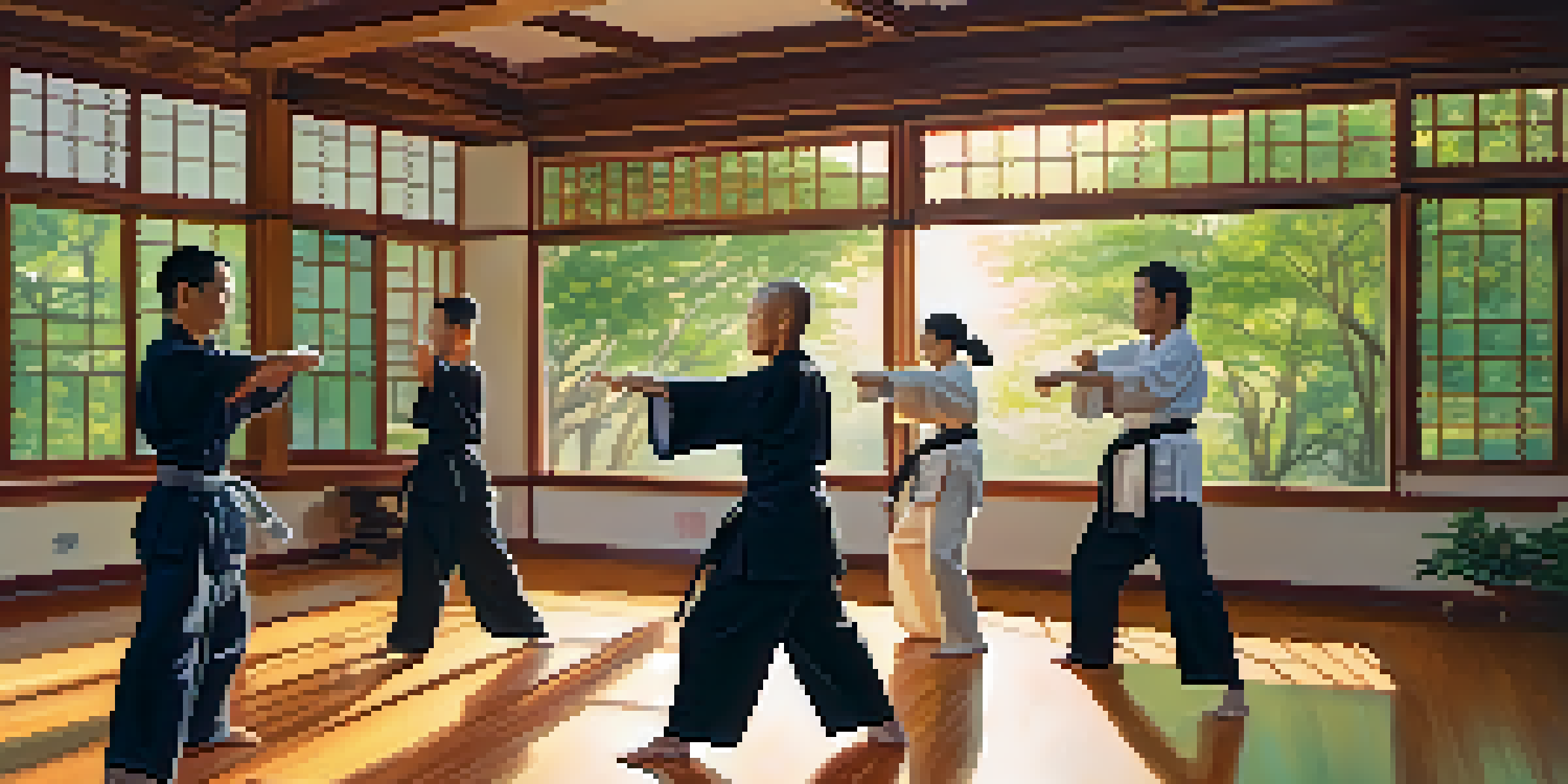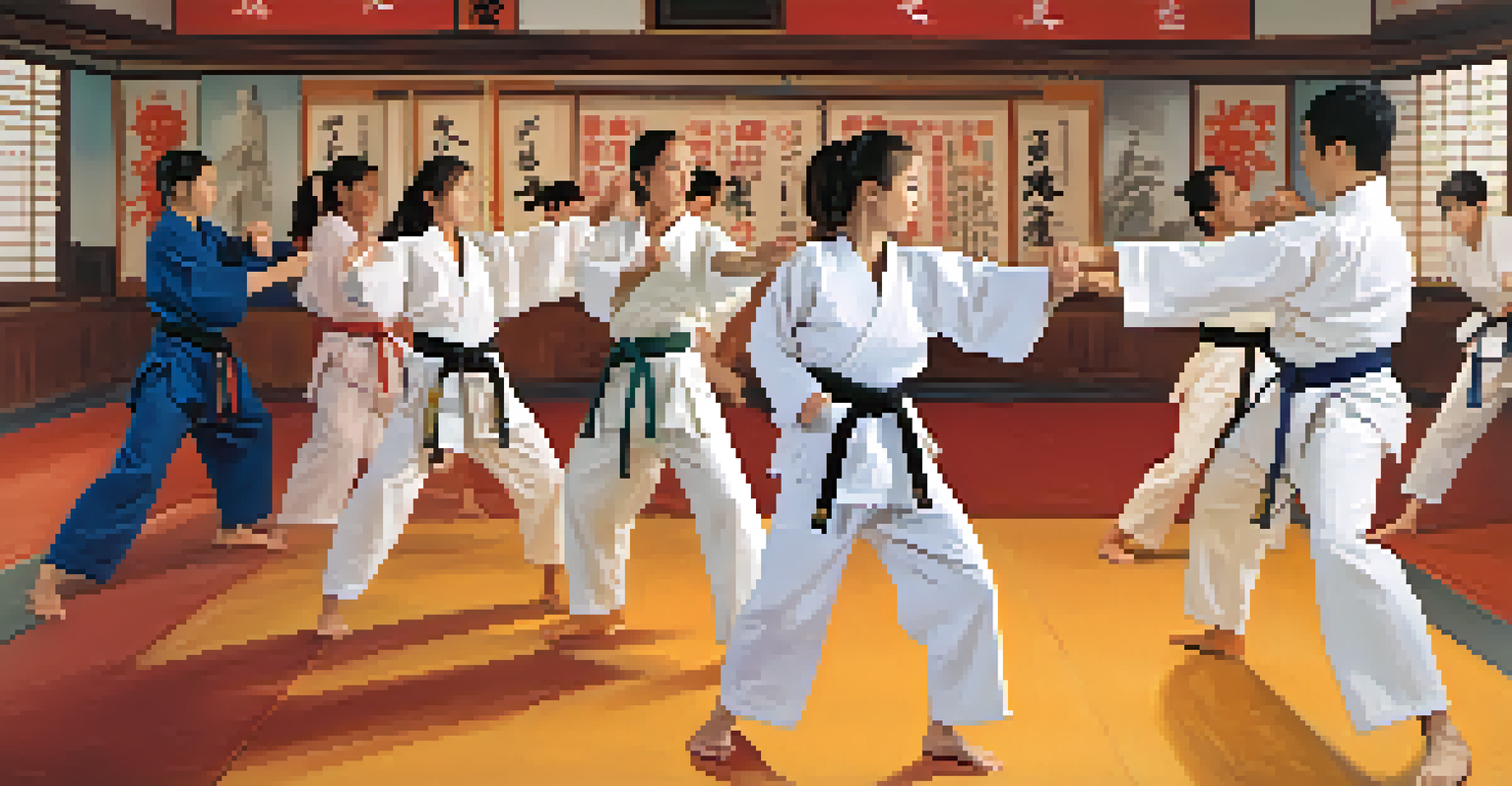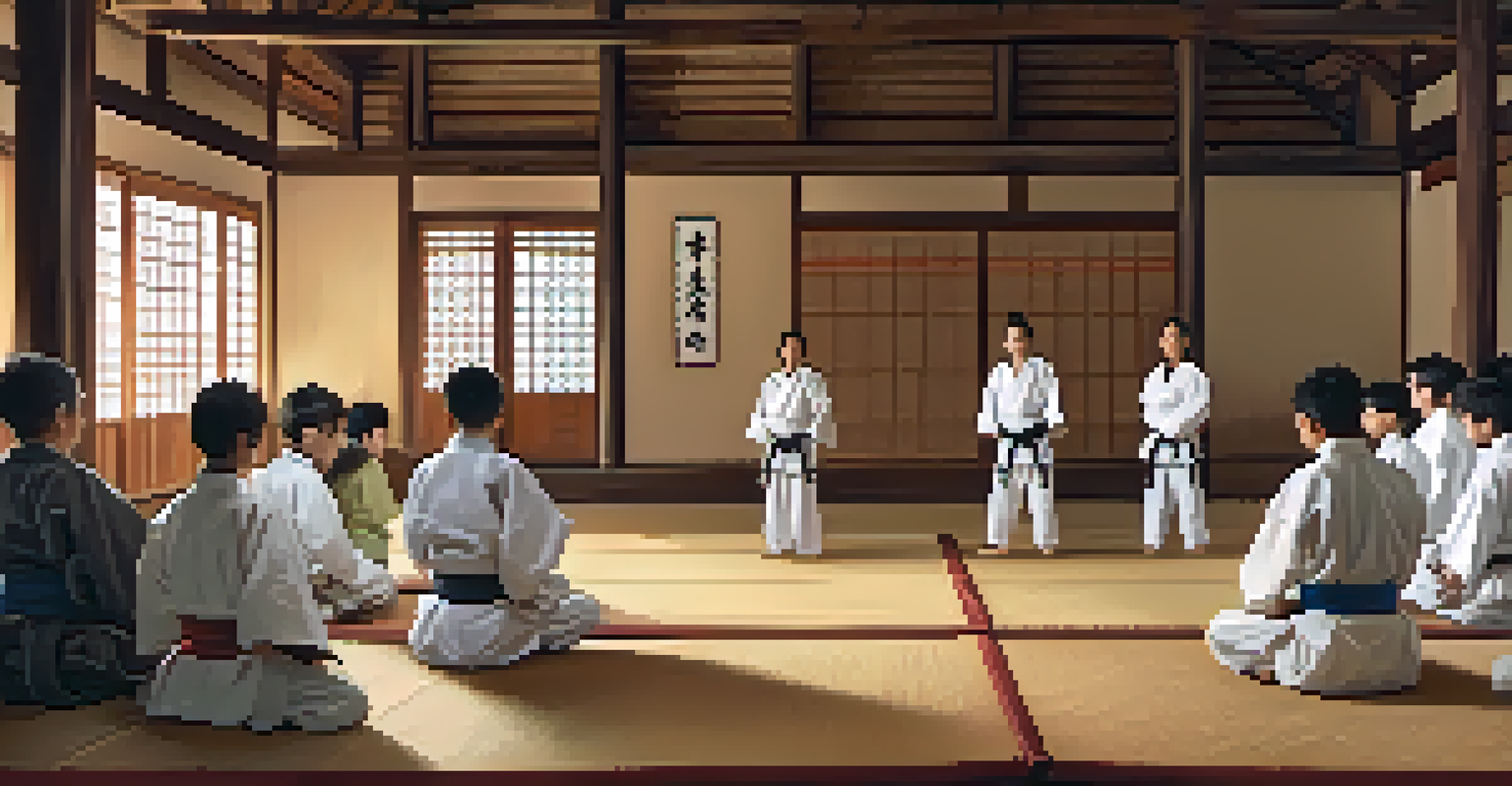Benefits of Martial Arts for Enhancing Physical Recovery

Understanding Martial Arts and Recovery Benefits
Martial arts encompass various disciplines that not only teach self-defense but also promote physical wellness. Engaging in these practices can significantly enhance the recovery process after injuries. Whether it’s karate, judo, or tai chi, each form offers unique benefits that can aid in physical rehabilitation.
Martial arts are a way of life. They teach you discipline, respect, and how to focus your mind and body.
By focusing on controlled movements and body awareness, martial arts provide a framework for improving strength and flexibility. This is crucial for anyone recovering from an injury, as it helps to rebuild the body while minimizing the risk of re-injury. The holistic approach of martial arts encourages both physical and mental healing.
Furthermore, martial arts emphasize discipline and perseverance, which can be motivating factors during recovery. Participants often find that the mental fortitude developed through training translates into a greater determination to heal and regain their physical capabilities.
Increased Strength and Flexibility Through Training
One of the most significant benefits of martial arts is the improvement in strength and flexibility. Training in martial arts involves a variety of movements that engage different muscle groups, helping to rebuild strength after an injury. As practitioners progress, they often notice enhanced muscle tone and overall fitness.

Flexibility is equally important during recovery, as it helps to prevent stiffness and improve range of motion. Many martial arts incorporate stretching routines that assist in increasing flexibility, allowing the body to move more freely. This can be particularly beneficial after surgeries or prolonged periods of inactivity.
Martial Arts Aid Physical Recovery
Engaging in martial arts can significantly enhance the recovery process from injuries by improving strength, flexibility, and overall physical wellness.
Moreover, the focus on controlled movements in martial arts can help individuals learn how to move their bodies more efficiently, further aiding in recovery. By developing strength and flexibility, practitioners not only recover faster but also lay the groundwork for a healthier lifestyle.
Improved Balance and Coordination for Better Recovery
Balance and coordination are essential components of physical recovery, especially after injuries that affect mobility. Martial arts training focuses heavily on these skills, which can be incredibly beneficial for rehabilitating the body. As individuals practice various techniques, they naturally enhance their body awareness and stability.
The greatest weapon against stress is our ability to choose one thought over another.
Improving balance through martial arts can help prevent future falls or injuries, particularly for older adults or those recovering from lower-body injuries. The exercises often involve shifting weight and maintaining control, which strengthens the stabilizing muscles that support the joints.
Additionally, better coordination leads to more efficient movement patterns in daily life. This not only aids in the recovery process but also contributes to an overall improved quality of life, making everyday tasks easier and safer.
Mental Well-Being and Its Role in Physical Recovery
The mind-body connection is a powerful aspect of the recovery process, and martial arts excel in fostering this relationship. Practicing martial arts encourages mindfulness, which can help reduce stress and anxiety during recovery. When individuals feel mentally balanced, they are often more motivated to engage in their healing journey.
Martial arts training also promotes a sense of community and support, which can be vital for those recovering from injuries. The camaraderie found in martial arts classes can alleviate feelings of isolation, providing emotional encouragement as practitioners work toward their recovery goals.
Mental Benefits of Martial Arts
Martial arts training fosters mental resilience and mindfulness, helping individuals manage stress and stay motivated during their recovery journey.
Furthermore, the focus on goal-setting and achievement in martial arts can cultivate a positive mindset. Setting small, achievable goals during training can instill a sense of accomplishment, reinforcing the idea that recovery is a journey worth pursuing.
Building Resilience and Discipline Through Practice
Martial arts are renowned for instilling discipline and resilience in practitioners. These qualities are incredibly valuable during the recovery process, as they encourage individuals to push through challenges and setbacks. Regular training helps to develop a strong work ethic, which can be pivotal when facing the difficulties of rehabilitation.
As individuals practice martial arts techniques, they learn the importance of persistence. This mindset not only helps in physical training but also transfers to the recovery journey, reminding practitioners that progress takes time and dedication. Each session in the dojo becomes a step toward healing.
Moreover, martial arts teach practitioners how to cope with failure and learn from it. This ability to accept setbacks and keep moving forward is crucial in recovery, as it fosters a growth mindset that can lead to long-term success.
Enhancing Cardiovascular Health for Better Recovery
Engaging in martial arts can provide an excellent cardiovascular workout, which is essential for overall health and recovery. Improved cardiovascular fitness increases blood flow, delivering essential nutrients to healing tissues and promoting faster recovery. This is particularly important for individuals who may have been sedentary due to injury.
Many martial arts classes incorporate high-intensity training, which can boost endurance and stamina. This not only helps in recovery but also enhances overall physical performance. As practitioners gain strength and endurance, they often find themselves feeling more energetic and capable.
Community Support in Recovery
Joining a martial arts class provides social connections and support, making the often isolating recovery experience feel more achievable and uplifting.
Additionally, a strong cardiovascular system supports the body's ability to manage stress and recover from physical exertion. The combination of physical activity and mental focus in martial arts creates a balanced approach to health that can lead to lasting benefits.
Social Connections and Support in Martial Arts
The social aspect of martial arts cannot be overlooked, especially when it comes to recovery. Joining a martial arts class provides an opportunity to connect with others who share similar interests and goals. This sense of belonging can be incredibly uplifting during the often isolating experience of recovery.
Having a support system in place is crucial for maintaining motivation and accountability. In martial arts, practitioners often encourage one another, celebrate milestones, and share experiences. This supportive environment can make the recovery process feel less daunting and more achievable.

Moreover, interacting with fellow students and instructors fosters a sense of community that enhances the overall experience. The relationships built through martial arts can lead to lasting friendships and provide ongoing support long after recovery is complete.
Conclusion: A Pathway to Recovery Through Martial Arts
In summary, martial arts offer a multifaceted approach to enhancing physical recovery. From building strength and flexibility to improving mental well-being, the benefits are vast and varied. As individuals engage in martial arts training, they not only heal but also cultivate skills that can lead to a healthier, more balanced life.
The discipline, resilience, and social connections developed through martial arts create a supportive environment for recovery. Practitioners learn to embrace challenges and celebrate progress, making the journey toward healing more rewarding.
For anyone considering martial arts as part of their recovery process, it's essential to find a class that resonates with them. With the right guidance and support, martial arts can be a transformative pathway to physical and mental well-being.